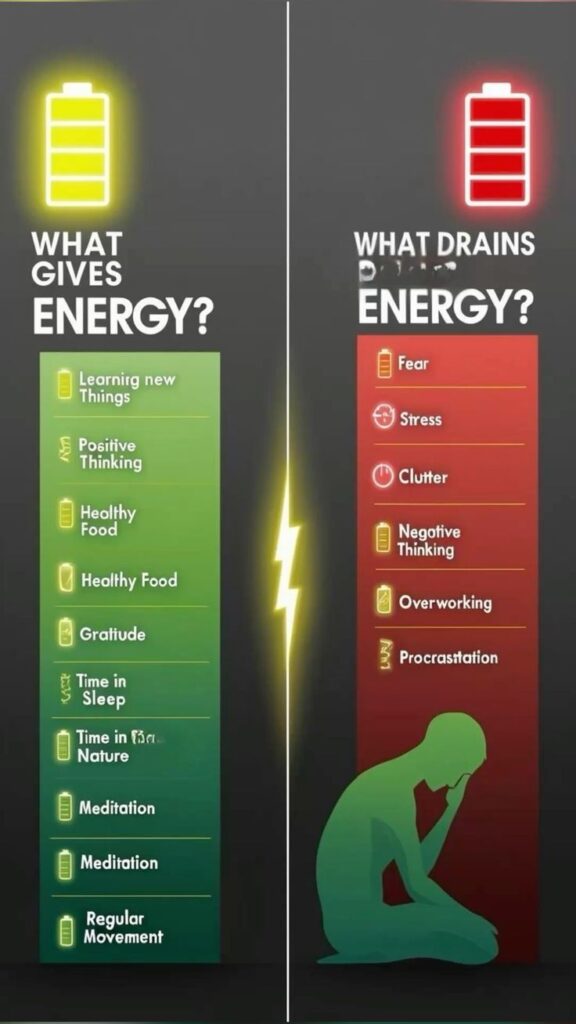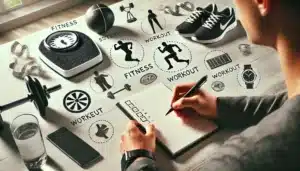1. Why Boosting Your Energy Matters
Are you tired of feeling drained halfway through the day? Do you wonder why some people seem to radiate enthusiasm while you struggle to focus on the simplest tasks? Learning to boost your energy can dramatically enhance every facet of your life—from productivity and creativity at work to the joy and fulfillment in personal relationships.
In our always-connected world, it’s easy to neglect the fundamental habits that keep our inner battery charged. This comprehensive guide will walk you through the science and practical strategies behind what truly gives you energy and what drains your energy. By understanding these factors, you’ll be better equipped to manage your daily life, maintain high energy levels, and cultivate a sense of well-being.
Quick Fact: According to a 2022 report from the American Psychological Association, 77% of people experience physical and mental stress that negatively impacts their energy levels.
2. How Energy Works: The Multi-Dimensional Approach
Before diving into what gives energy vs. what drains energy, let’s clarify what we mean by “energy.” Contrary to popular belief, energy isn’t limited to just physical stamina or the ability to do tasks. Energy is a multi-dimensional concept that includes:
- Physical Energy
- Derived from nutrition, exercise, and sleep.
- Manifests as strength, endurance, and overall bodily well-being.
- Emotional Energy
- Influenced by relationships, mood, and emotional resilience.
- Impacts how quickly you recover from setbacks or handle daily stresses.
- Mental Energy
- Linked to cognition, focus, and creativity.
- Can be depleted by overthinking, excessive screen time, and high mental workloads.
- Spiritual Energy
- Connected to sense of purpose and alignment with personal values.
- Often renewed through introspection, mindfulness, or engaging in meaningful activities.
Recognizing these four aspects will help you boost your energy holistically, rather than applying band-aid fixes that only target one area.
3. Mindset and Energy: The Hidden Connection
Your mindset is a powerful engine that drives your energy levels. Research published in the Harvard Business Review (source) found that individuals who adopt a growth mindset—the belief that abilities and intelligence can be developed—report higher motivation, engagement, and resilience. These qualities correlate strongly with increased energy and overall life satisfaction.
- Positive Mindset: Encourages you to find solutions rather than dwell on problems, thus conserving mental and emotional energy.
- Negative Mindset: Amplifies stress, creates anxiety, and often leads to fatigue.
By consciously shaping your thoughts (through affirmations, reframing, and mindful awareness), you can drastically boost your energy daily.

4. What Gives Energy
The left side of the referenced infographic emphasizes activities and attitudes that fuel our inner battery. Below is a detailed breakdown of each, including the why and how of implementing these energy-boosting habits.
4.1 Learning New Things
Why It Matters
Learning stimulates the brain’s neuroplasticity, making it more adaptable and agile. This mental flexibility helps keep your mind sharp, optimistic, and energized.
How to Start
- Micro-Learning: Dedicate 15 minutes daily to reading an article, exploring an online course, or listening to a podcast.
- Hobby Projects: Pick a small, manageable side project—like photography, coding, or painting—that sparks your curiosity.
Statistic: Statista reported in 2016 that about 46% of Americans actively learn new skills annually, leading to higher cognitive performance.
4.2 Positive Thinking
Why It Matters
Positive thinking reshapes your emotional and mental landscape, making stressful events easier to handle. This constructive attitude keeps you focused on growth and solutions, reducing the drag on your mental energy.
How to Start
- Daily Affirmations: Write or speak short phrases like, “I am capable of achieving my goals.”
- Reframe Setbacks: Turn “I failed at this” into “I learned something new from this experience.”
- Positive Community: Surround yourself with people and online communities that inspire and elevate your mindset.
Visual Prompt: “Create an Instagram-ready quote card with gradients and modern fonts. Add an affirmation like ‘Every day, I grow stronger and more focused.’”
4.3 Healthy Food
Why It Matters
Nutrition provides the foundation for boosting your energy. High-quality proteins, fats, and carbohydrates supply consistent fuel, while sugary or processed foods lead to rapid spikes and crashes.
How to Start
- Balanced Meals: Aim for 40% carbs, 30% protein, and 30% healthy fats in each meal.
- Hydration: Drink at least 2 liters of water daily. Even mild dehydration reduces cognitive and physical performance.
- Mindful Eating: Chew thoroughly and avoid distractions like scrolling on your phone during meals.
External Link: Check out the World Health Organization’s guidelines on balanced diets for comprehensive insights.
4.4 Gratitude
Why It Matters
Practicing gratitude changes your focus from what’s lacking to what’s already good in your life. This mindset shift has been shown to elevate mood, increase energy, and improve overall mental health.
How to Start
- Gratitude Journal: Write down 3 things you’re thankful for each morning or evening.
- Daily Checkpoints: Set an alarm 2–3 times a day to pause and note a quick gratitude statement.
- Thank-You Notes: Send short messages to friends, family, or colleagues expressing appreciation.
Statistic: A 2020 survey by the Greater Good Science Center found that regular gratitude practice can boost energy levels by up to 15%.
4.5 Time in Sleep
Why It Matters
Quality sleep is a non-negotiable element of boosting your energy. According to the National Sleep Foundation, adults need 7–9 hours of restful sleep to maintain optimal cognitive and physical health.
How to Start
- Consistent Bedtime: Stick to a set sleep schedule to regulate your internal clock.
- Screen Curfew: Avoid electronics at least 30 minutes before bed to reduce blue-light exposure.
- Sleep-Friendly Environment: Keep the bedroom cool, dark, and quiet.
4.6 Time in Nature
Why It Matters
Nature acts like a mental reboot. Studies in environmental psychology confirm that a mere 20 minutes in a natural setting can reduce cortisol (the stress hormone) and increase energy.
How to Start
- Short Breaks: Walk outside for 10–15 minutes at lunchtime.
- Weekend Getaways: Plan hikes, beach trips, or visits to botanical gardens.
- Indoor Plants: If you’re stuck inside, bring nature indoors with houseplants.
Statistic: The American Psychological Association found that individuals who spend at least two hours per week in nature report significantly higher vitality levels.
4.7 Meditation
Why It Matters
Meditation improves focus, self-awareness, and stress resilience. Over time, these benefits boost your energy by reducing the mental clutter that often leads to fatigue.
How to Start
- Micro-Meditations: Start with 2–5 minutes of guided practice using apps like Headspace or Calm.
- Breath Work: Focus on the sensation of breathing to anchor your mind in the present.
- Mindful Moments: Incorporate short mindful checks throughout the day—before starting your work or after a meeting.
Transform Your Career with Professional Certification
4.8 Regular Movement
Why It Matters
Physical activity releases endorphins, often called “feel-good hormones,” that elevate your mood and boost your energy. The World Health Organization recommends at least 150 minutes of moderate exercise per week.
How to Start
- Mini Workouts: Do quick 2-minute bursts of exercise (like squats or push-ups) every hour.
- Active Hobbies: Choose activities you genuinely enjoy—dancing, cycling, or even rock climbing.
- Structured Routines: If you prefer consistency, follow a workout schedule (e.g., Monday, Wednesday, Friday).
5. What Drains Energy
Just as crucial as knowing what fuels your energy is recognizing what depletes it. The right side of the infographic highlights common culprits that siphon away your vitality.
5.1 Fear
Why It Matters
Fear activates your fight-or-flight response, causing a surge in stress hormones like cortisol. Chronic fear places the body in a constant state of alert, leading to emotional and physical exhaustion.
How to Combat
- Name Your Fear: Identifying it reduces its power over you.
- Exposure Therapy: Gradually face your fear in small, controlled steps.
- Professional Support: Therapists can provide coping strategies to reframe persistent anxieties.
5.2 Stress
Why It Matters
Stress is a top reason many people fail to boost their energy. The American Psychological Association reports that chronic stress can disrupt sleep, weaken the immune system, and impair mental focus.
How to Combat
- Time Management: Use apps like Trello or Asana to prioritize tasks.
- Relaxation Techniques: Experiment with yoga, progressive muscle relaxation, or warm baths.
- Boundaries: Learn to say “no” to avoid overcommitment.
5.3 Clutter
Why It Matters
Messy surroundings—whether physical, digital, or mental—act as a visual and cognitive distraction. This clutter competes for your attention, draining your mental energy.
How to Combat
- Daily Declutter: Spend 5–10 minutes tidying up.
- Digital Cleanup: Organize folders, delete unused apps, and unsubscribe from irrelevant newsletters.
- Minimalist Mindset: Keep what’s necessary and donate or discard what isn’t.
5.4 Negative Thinking
Why It Matters
Persistent negative thoughts—pessimism, catastrophic thinking, or self-criticism—can become self-fulfilling prophecies. This mental environment exhausts you and makes it hard to boost your energy.
How to Combat
- Cognitive Reframing: When a negative thought arises, look for evidence that contradicts it.
- Mindset Mentors: Follow mental health experts on social media for daily tips.
- Affirmation Stacks: Counter a negative thought with two or more positive affirmations.
5.5 Overworking
Why It Matters
While short periods of intense work can be productive, consistently working without adequate rest leads to burnout. Overworking deprives you of the necessary downtime to recharge.
How to Combat
- Pomodoro Technique: Work for 25 minutes, then take a 5-minute break to avoid mental fatigue.
- Automate and Delegate: Use tools like Zapier or IFTTT to handle repetitive tasks.
- Work-Life Integration: Instead of a perfect balance, integrate active breaks, social time, and personal interests into your day.
Internal Link: For more on avoiding burnout, read our post on Quick Mindset Shifts for Personal Growth.
5.6 Procrastination
Why It Matters
Putting off tasks leads to last-minute scrambles and unnecessary anxiety. This mental strain saps your focus and energy, creating a cycle of guilt and further procrastination.
How to Combat
- Break It Down: Divide large projects into smaller tasks to reduce overwhelm.
- Micro-Deadlines: Set short, specific deadlines for each mini-task.
- Reward System: Celebrate small wins to reinforce positive habits.
6. 10 Proven Strategies to Reclaim Vitality
Below are 10 practical ways to consistently boost your energy, combining insights from both the “gives” and “drains” lists:
- Morning Ritual
- Start with a positive affirmation or a short meditation session (2–5 minutes).
- Optionally, include a brief stretch or jog to activate your body.
- Regular Movement Breaks
- Every hour, stand up and do a quick set of exercises or stretches.
- Reduces physical stiffness and refreshes mental alertness.
- Hydration and Snacks
- Keep a water bottle nearby.
- Choose nutrient-dense snacks like nuts, fruits, or protein bars.
- Gratitude Checkpoints
- Set alarms on your phone to remind yourself to note something you’re grateful for.
- This habit shifts your mindset to positivity.
- Digital Boundaries
- Establish “no-phone zones” (e.g., during meals or the last 30 minutes before bed).
- Curate your social media feeds to follow uplifting content.
- Mindful Meal Planning
- Pre-plan healthy meals to avoid impulsive junk-food choices.
- Include a variety of whole grains, lean proteins, and colorful vegetables.
- Declutter Regularly
- Tackle one physical area (desk, closet) or digital area (email inbox) daily.
- A clean space translates into a calm, energized mind.
- Scheduled Relaxation
- Reserve at least 15–30 minutes daily for activities like reading, journaling, or a soothing bath.
- Helps lower cortisol levels.
- Accountability Partners
- Share your energy-boosting goals with a friend who can check in on your progress.
- Mutual support amplifies commitment and motivation.
- Regular Self-Check
- At least once a month, evaluate what’s draining or fueling your energy.
- Adjust your routines accordingly.
7. Deep Dive: Long-Term Habits for Sustained Energy
It’s one thing to get a quick energy fix—like chugging coffee or taking a power nap—and quite another to maintain vibrant energy every day. Let’s explore how to make sustainable changes.
A. Structured Routines
- Morning Anchors: Meditation, journaling, or a short walk sets a positive tone for the day.
- Evening Wind-Down: Unplug from devices, dim the lights, and engage in calming activities (like light reading) to prep for quality sleep.
B. High-Quality Relationships
- Positive Reinforcement: Spend time with people who uplift you.
- Healthy Conflict Resolution: Address problems directly but empathically, preventing lingering stress and resentment.
C. Periodic Self-Assessments
- Monthly Check-Ins: Track your progress on energy levels. Identify new stressors or negative habits.
- Professional Guidance: If chronic fatigue persists, consult a health professional for personalized advice.
Related Article: Check out our deep dive on Building Better Habits for Lasting Change for more tips on habit formation.
8. Environmental Factors: How Your Surroundings Affect Vitality
Your environment either supports or sabotages your attempts to boost your energy. Consider the following:
- Lighting
- Natural Light: Aim to get at least 15 minutes of direct sunlight daily to reset your circadian rhythm.
- Artificial Light: Use daylight-mimicking LED bulbs in your workspace for better focus.
- Sound
- White Noise: Some individuals focus better with consistent background noise.
- Noise-Canceling Headphones: If you’re sensitive to sound, reduce distractions during deep work sessions.
- Aroma Therapy
- Essential Oils: Scents like peppermint, lemon, or eucalyptus can invigorate your mind.
- Fresh Air: Open windows or step outside frequently to circulate fresh air.
- Temperature
- Optimize for Comfort: Most people thrive in an environment between 68–72°F (20–22°C).
- Dress in Layers: Ensure you can easily adjust your clothing to maintain comfort.
- Organized Workspace
- Clear Desk Policy: Keep only essentials on your desk.
- Task-Specific Zones: Have distinct areas (if possible) for focused work, relaxation, and creative tasks.
9. FAQs: Common Questions About Boosting Your Energy
Below are some frequently asked questions and their answers to help you further boost your energy:
Q1. Is it normal to have energy dips during the day?
Yes. Energy naturally fluctuates due to circadian rhythms, meal times, and workload. Try scheduling critical tasks during your peak hours and use breaks wisely during energy troughs.
Q2. How long does it take to see results from these energy-boosting habits?
Most people see noticeable changes within 1–2 weeks of consistent practice, such as getting better sleep or adopting a healthier diet. Long-term changes become evident over several months.
Q3. What if meditation is challenging for me?
Start small—try 2-minute guided meditations. Gradually build up as your concentration improves. Even short sessions can significantly boost your energy over time.
Q4. Can overworking ever be beneficial?
Brief periods of intense work can be effective under deadlines. However, chronic overworking without rest or sleep leads to burnout and is not sustainable.
Q5. How do I handle negative people in my environment?
Set personal boundaries and limit interactions when possible. Use active listening but avoid internalizing negativity. Seek supportive relationships that nurture your well-being.
Q6. Are power naps helpful?
Yes. A 10–20-minute power nap can reinvigorate your mental focus and productivity, especially when you hit an afternoon energy slump.
Q7. How can I reduce digital clutter?
Unsubscribe from unnecessary newsletters, organize your email into labeled folders, and periodically delete apps or files you no longer use.
Q8. Should I rely on caffeine to boost my energy?
Moderate caffeine intake can be beneficial, but excessive use leads to dependency and can disturb sleep patterns. Aim for balance and avoid late-day caffeine.
10. Conclusion : Take Charge of Your Energy
Maintaining high energy levels isn’t a mysterious art reserved for the lucky few. It’s the outcome of consistent, deliberate choices—each habit, environment tweak, and mindset shift compounds over time. By adding more of what gives energy (like learning new things, positive thinking, healthy food, and meditation) and cutting back on what drains energy (fear, stress, clutter, overworking), you’ll find yourself more focused, resilient, and fulfilled.
Take the First Step: Start by identifying just one positive habit—like setting a regular bedtime or adding 15 minutes of mindful learning each day—and one energy drainer—like clearing clutter or limiting social media. Implement these small changes for a week and observe the difference.
Final Call to Action
If you’re ready to take control of your energy and elevate your life, visit BestOfMotivation.com for more practical guides on personal growth, mindset, and time management. Whether you’re seeking better work-life balance or aiming to reach new career heights, the key is to boost your energy and show up every day as your most vibrant self.












